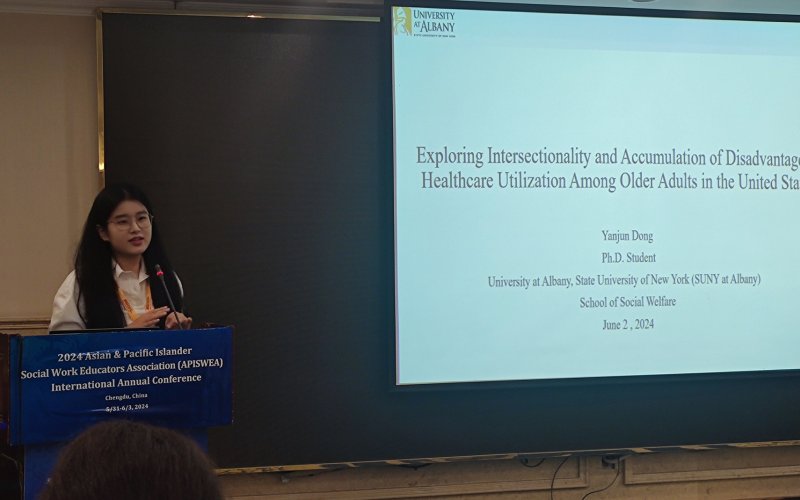Understanding Barriers to Health Care for Older Adults

ALBANY, N.Y. (Jan. 30, 2025) — Social work PhD student Yanjun Dong saw firsthand how her older family members struggled to navigate the health care system—including long wait times, prohibitive costs, and difficulty understanding complex and technical information. These experiences deepened her interest in advocating for improved health care access and utilization for older adults, ultimately leading her to a focus on gerontology in social work.
“As social workers, we have a collective responsibility to care for older adults, recognizing their immense contributions to society. Ensuring they receive the care they need is not just a matter of health; it is a matter of dignity and respect,” Dong says.
Her research focuses on identifying and addressing the gaps in the healthcare system that prevent older adults from receiving proper care.
“The main goal is to make our system more equitable, inclusive, and responsive to the needs of all older adults,” explains Dong, who has seen how access to services is not always equal — along with how this can exacerbate health disparities for marginalized communities— through volunteer work in emergency rooms and therapy centers in Albany and Los Angeles.
Dong explores how people use health care services as they age, taking into account factors like race, sex and income. Her findings, which are under review for publication, show that older adults who identify as Black, indigenous, or as a person of color (BILPOC) do not utilize health care services as much as others, especially if they live in poverty.
“Older adults from BIPOC communities, especially those with low incomes, might have difficulty getting prescription medications due to barriers like cost or access. By contrast, they may rely more on services like home health care, where a nurse or caregiver comes to their home to help with their health needs. This suggests that while they might be unable to access some types of care, like prescription drugs, they might use other services more frequently. This finding shows that older adults from different backgrounds may have different needs. Building upon my findings, we need to make sure everyone can get the care they need, no matter who they are or where they come from,” she says.
Recently, Dong presented at the Asian and Pacific Islander Social Workers Educators Association conference in Chengdu, China (pictured above). She also won the student paper award at the 51st annual conference of the State Society on Aging of New York, where she shared another section of her research, which is focused on gender disparities in health care utilization among older adults. Her research in this area shows the gender disparities in health care utilization and identifies factors that influence how older adults of different genders access and use health care services. Now, Dong is a student researcher in the new Center for Healthy Aging.
“Being able to contribute to initiatives that advance our understanding of aging and result in tangible improvements in health care access, social support, and overall quality of life for older people is rewarding. I'm looking forward to the collaborations and innovations emerging from this center, and I'm eager to see how our work can lead to real-world change, helping older adults lead healthier lives,” she says.
This article was originally published in the 2024 CIHS magazine.


